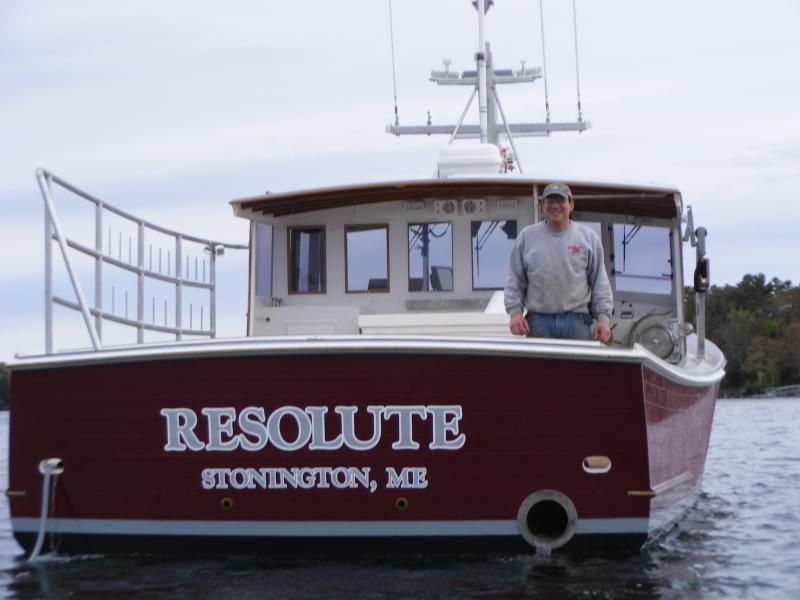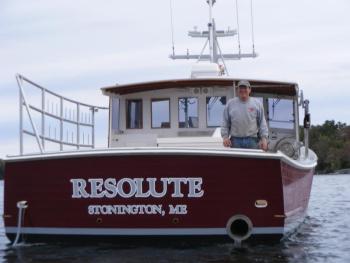Traditional wooden boat building going strong in South Bristol
 The new addition at John's Bay Boat, Resolute. Courtesy of Brian Robbins
The new addition at John's Bay Boat, Resolute. Courtesy of Brian Robbins
 The new addition at John's Bay Boat, Resolute. Courtesy of Brian Robbins
The new addition at John's Bay Boat, Resolute. Courtesy of Brian Robbins
Peter Kass grew up in Arlington, Mass., tinkering with old boats and junk cars. The owner of John’s Bay Boat Company in South Bristol is the first to admit he wasn’t much for school, and he knew he didn’t want to go to college.
“I probably wasn’t interested in too much in particular, but I liked boats the best,” he said.
Kass has managed to carve out a niche, successfully building wooden boats for working class fishermen in a time when most have switched to fiberglass. His success is defined by the idea that a custom built wooden boat can make a long day out on the water feel a little less harsh on the body.
Kass’s history with boats began at 17 when he graduated from high school and went down to Urbana, Va., to work in the boat yard of John L. Conboy. He came to Maine in the early ’80s, worked for a time at Harvey Gamage Shipyard in South Bristol and then for two years at Goudy & Stevens in East Boothbay.
Even back then he knew that wooden boats were his great love. When he heard that Bruce Cunningham of Padebco Custom Boats in Round Pond had landed a wooden sailboat to build and was looking for another guy to help out, he took the opportunity.
His time there was truly a learning experience for him, he said. More accustomed to the huge yards at Harvey Gamage and Goudy & Stevens, Kass saw how small-scale boat building could really work.
“Bruce was running the kind of place I could relate to,” Kass said. “At the time, it was just a little wooden building and a railway, a three-man outfit. My operation now is more or less along the lines of what Padebco was back then.”
In 1981, he heard about two acres of land for sale in South Bristol on the steep banks of John’s Bay. He bought it for cheap, built his own shop in 1982, and John’s Bay Boat Company was born. After a short stint storing boats, he hired his first crew and in 1984 built his first boat, a 24-foot inboard power “lobster-style” pleasure boat.
Everything changed in 1985 when a fisherman from Portsmouth, N.H., contacted Kass about building a lobster boat. He had been referred to Kass by the renowned boat builder and designer Carroll Lowell of Yarmouth, who had become a friend and mentor to Kass.
That winter, Kass and his crew built the Sharon Roseanne, a 46-foot wooden lobster boat that changed everything. “It was a successful project, a good boat,” Kass said. “We did a decent job.” And word got out about Kass and his “decent job.” Business picked up, and it wasn’t long before Kass and his crew had four or five boats on order at a time.
In 1990, fate and chance brought change to John’s Bay Boat once again when a respected fisherman out of Stonington named Bob Williams stopped by the boat yard. Things had been slow for Kass that year. The economy was down, the lobster prices were high. Williams had seen Kass’ boats in the fish papers and wanted to check out his operation.
Just like so many other fishermen in the ’80s, Williams had bought a fiberglass boat, a Duffy 35, and had been fishing out of it ever since. But by 1990, he was in his fifties and he was starting to feel it.
“His legs were killing him, and he blamed the boat,” Kass said. “It was shaking and vibrating. His legs were hurting.”
Williams wanted to go back to a wooden boat, and he wanted Kass to build it for him.
Kass finished Williams’ boat in 1991. Shortly after, a big shift happened in the waters off of Stonington. Suddenly, any decent fisherman in Stonington was doing well. And business picked up for Kass, too. Every other boat or so after that was for a fisherman out of Stonington. Kass’s latest project, the 46 foot long Resolute, was launched on May 16 for Ryan Larrabee of Stonington.
Before Stonington, the hot spot was Spruce Head, and before that, it was Casco Bay. His boats and his reputation among these tight-knit fishing communities are his biggest assets. “Word of mouth,” he said, when asked how he sells boats. More than advertisements, more than boat shows.
“My boats are made to go through the water and not over them, which means they’re not super fast,” he said. “But they go along decently.
Most of the boats he builds are for guys who tried glass boats first, like Bob Williams.
When asked what he thought about the belief that wooden boats are more expensive to build and harder to maintain than fiberglass, he shook his head.
“If you want a custom built, high end boat, they aren’t any more expensive than a glass boat,” he said. “The hull is only a sixth of the cost. The equipment is all the same: the engine, the drive train, the hydraulics. The price of that stuff has gone up way more than the price of the hull.”
Despite all of this, Kass admits that he’s worried about the future of wooden boat building in Maine.
“I’m scared. I’m petrified, for the whole country, really. There’s no pride or prestige in the trade anymore.” He said one of the biggest challenges to staying afloat in this business today is finding and keeping a good crew. “Without it, you’re sunk.”
He said he thinks the problem is a reflection of the changing times, seen in the attitudes and interests of young people in the state.
“No one knows this stuff anymore,” he said. “Used to be, that’s what all us kids did growing up; messed around with old boats, fixed cars. That’s just what we did. But people just don’t do that anymore.”
When he worked at Goudy & Stevens back in the early ’80s, he was surrounded by a different class of worker in the boat yards; men who took pride in their work and really cared about the craft.
“That kind of thing doesn’t exist anymore. The job isn’t who you are anymore. You just don’t see people getting really good because they want to.”
His daughter posted a bunch of help wanted ads for him back in January. He said the response was great. He was getting four or five inquiries every day but in the end, he wasn’t able to find anyone.
“It just seems like such a mystery. Seems like when I was that age, there was a bunch of us interested in it. I was just fascinated with all this stuff. I wasn’t the only one. But these young guys just aren’t into it anymore.”
Kass said that he never wants to actually retire completely, but in 10 years or so he’d like to have someone step in and take over where he could take some time off if he wanted to.
“There is such a good opportunity here. I could teach someone so much more than a boat school could, if they’ve got the interest.” He hopes that something will work out, that someone with the ability and interest will find his or her way down the peninsula.
In a world of fiberglass, Kass has managed to keep his heart and his craft in wooden boats.
“I live and breathe this stuff,” he said. “I live next door, I walk over; it’s all I think about.”
When asked what he would want to be doing in a different life, he said without hesitation, “Oh, I wouldn’t have it any other way.”
Event Date
Address
United States






















